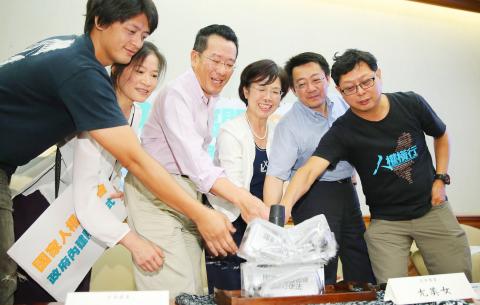Civic groups yesterday called for President Tsai Ing-wen (蔡英文) to fulfill her election promise of establishing a national human rights commission, saying the Control Yuan and Council of Grand Justices have been unwilling to examine domestic laws in light of international norms.
Members of Covenants Watch, the Taiwan Association for Human Rights and other groups joined Democratic Progressive Party (DPP) legislators Yu Mei-nu (尤美女) and Wellington Koo (顧立雄) at an event at which they used a hammer to smash open two blocks of ice containing pieces of paper representing legislation to create the commission, which they said has been “frozen” since being proposed by former president Chen Shui-bian (陳水扁) due to Chinese Nationalist Party (KMT) opposition.
“Every government will make mistakes, and there needs to be an internal mechanism to address them and prevent the impairment of human rights,” Convenants Watch convener Huang Song-lih (黃嵩立) said, adding that the commission could raise domestic awareness of human rights by comparing domestic laws and institutions with international laws, submitting recommendations for reform to relevant government agencies.

Photo: Liao Chen-huei, Taipei Times
“While it is unlikely that the commission could resolve all the problems of individual cases, it would prod the government into doing the right thing,” he said.
“If we want to internalize international human rights treaties, a human rights commission is clearly a necessary support mechanism for full implementation,” Taiwan Association of Human Rights executive board member Fort Liao (廖福特) said.
While the Legislative Yuan in 2009 ratified the International Covenant on Civil and Political Rights and the International Covenant on Economic, Social and Cultural Rights, activists have said implementation has failed, as government ministries have failed to fully harmonize domestic laws and regulations with treaty requirements.
Liao dismissed concerns that granting such a commission investigative powers would infringe on the constitutional privileges of the Control Yuan, which has already established a special committee for the protection of human rights.
“The commission’s investigations would largely focus on structural problems,” he said, adding that the Control Yuan’s investigations are limited to whether government officials have acted illegally or negligently in individual cases.
While Yu’s version of legislation would place the commission within the Presidential Office’s organizational structure, Koo’s version would establish it as an independent part of the Control Yuan to address constitutional concerns, mandating that 11 of the yuan’s 29 members be members of the commission and exempt their investigations and rulings from other members’ oversight.
Huang said that establishing the commission within the Control Yuan would place it in an organizational culture that could compromise its mission of reviewing domestic laws in light of international legal norms.
“As the Control Yuan’s responsibility is to examine whether officials have acted illegally or negligently, it only cares about whether any laws have been broken — which rules out any examination of whether a law might violate human rights,” he said, adding that the legal system is similarly ill-equipped to push for the adoption of international norms, because judges view themselves as defenders of domestic law.
“Ultimately, any human rights commission would face many of the same limitations as the Control Yuan and Council of Grand Justices, because they all depend on presidential appointments, but our hope is that having more people come forward [to investigate human rights] will have the potential to bring about some change,” he said.

The brilliant blue waters, thick foliage and bucolic atmosphere on this seemingly idyllic archipelago deep in the Pacific Ocean belie the key role it now plays in a titanic geopolitical struggle. Palau is again on the front line as China, and the US and its allies prepare their forces in an intensifying contest for control over the Asia-Pacific region. The democratic nation of just 17,000 people hosts US-controlled airstrips and soon-to-be-completed radar installations that the US military describes as “critical” to monitoring vast swathes of water and airspace. It is also a key piece of the second island chain, a string of

A magnitude 5.9 earthquake that struck about 33km off the coast of Hualien City was the "main shock" in a series of quakes in the area, with aftershocks expected over the next three days, the Central Weather Administration (CWA) said yesterday. Prior to the magnitude 5.9 quake shaking most of Taiwan at 6:53pm yesterday, six other earthquakes stronger than a magnitude of 4, starting with a magnitude 5.5 quake at 6:09pm, occurred in the area. CWA Seismological Center Director Wu Chien-fu (吳健富) confirmed that the quakes were all part of the same series and that the magnitude 5.5 temblor was

The Central Weather Administration has issued a heat alert for southeastern Taiwan, warning of temperatures as high as 36°C today, while alerting some coastal areas of strong winds later in the day. Kaohsiung’s Neimen District (內門) and Pingtung County’s Neipu Township (內埔) are under an orange heat alert, which warns of temperatures as high as 36°C for three consecutive days, the CWA said, citing southwest winds. The heat would also extend to Tainan’s Nansi (楠西) and Yujing (玉井) districts, as well as Pingtung’s Gaoshu (高樹), Yanpu (鹽埔) and Majia (瑪家) townships, it said, forecasting highs of up to 36°C in those areas

IN FULL SWING: Recall drives against lawmakers in Hualien, Taoyuan and Hsinchu have reached the second-stage threshold, the campaigners said Campaigners in a recall petition against Chinese Nationalist Party (KMT) Legislator Yen Kuan-heng (顏寬恒) in Taichung yesterday said their signature target is within sight, and that they need a big push to collect about 500 more signatures from locals to reach the second-stage threshold. Recall campaigns against KMT lawmakers Johnny Chiang (江啟臣), Yang Chiung-ying (楊瓊瓔) and Lo Ting-wei (羅廷瑋) are also close to the 10 percent threshold, and campaigners are mounting a final push this week. They need about 800 signatures against Chiang and about 2,000 against Yang. Campaigners seeking to recall Lo said they had reached the threshold figure over the